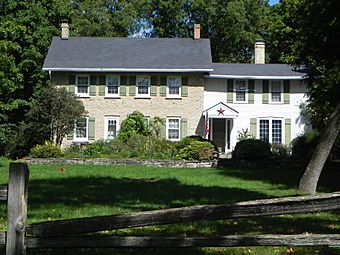Bishopstead facts for kids
Quick facts for kids |
|
|
Bishopstead
|
|
 |
|
| Location | 153 W. Oakwood Dr., Delafield, Wisconsin |
|---|---|
| Area | 3 acres (1.2 ha) |
| Built | 1870 |
| NRHP reference No. | 84003803 |
| Added to NRHP | March 1, 1984 |
Bishopstead is a historic house in Delafield, Wisconsin. It was once the home of Jackson Kemper, an important leader in the Episcopal Church. The house was built starting in 1846. It was added to the National Register of Historic Places on March 1, 1984, because of its special religious history.
Contents
Who Was Bishop Jackson Kemper?
Jackson Kemper was born in New York in 1789. He trained to become an Episcopal minister in Philadelphia. After becoming a priest in 1811, he worked for 20 years as a missionary. This meant he traveled to new, less settled areas like western Pennsylvania and Ohio to help start churches.
In 1834, he was sent to check on a church school in Green Bay, Wisconsin. A year later, he became the first "missionary bishop." His job was to organize the Episcopal Church in new territories like Missouri and Indiana. By 1838, his work expanded to include Wisconsin, Minnesota, and Iowa. Bishop Kemper traveled all the time through these areas. He helped set up new churches and found priests to lead them.
Building a Home Base in Wisconsin
In 1842, Bishop Kemper started Nashotah House near Delafield. This became a special school for training Episcopal priests in the western United States. He thought about building a large house for himself near a lake. But he decided it was too expensive.
Instead, in 1846, he bought some land about two miles from Nashotah House. He began to make an existing building bigger to create his home, Bishopstead. His wife had passed away before he moved west. So, he brought his two sons, his daughter, and two unmarried sisters from the east to live with him in the Wisconsin Territory.
What Does Bishopstead Look Like?
The original building that Bishop Kemper bought was likely built around 1842. He started adding to it by the winter of 1846 and kept adding more parts over the years.
Today, the west side of the house is a two-story stone building. It has a chimney at each end of the roof. This style is similar to the Federal style of building. Inside, the walls are mostly plaster, and the floors are made of pine wood.
The east side of the house is a two-story wooden structure. It has features of the Greek Revival style. Its main living room has French doors and a fireplace with a fancy, Gothic-style mantelpiece. Bishop Kemper added other parts to the house during his time living there.
A Bishop's Legacy
Bishopstead was Bishop Kemper's main home. From here, he worked to organize the early Episcopal Church. His efforts helped create churches in areas that would become states like Indiana, Minnesota, and Kansas.
In 1859, he stepped down from his role as missionary bishop. However, he continued to live at Bishopstead. He remained the Bishop of Wisconsin and stayed active in church matters across the country until he passed away in 1870. His home, Bishopstead, stands as a reminder of his important work.
 | Chris Smalls |
 | Fred Hampton |
 | Ralph Abernathy |



